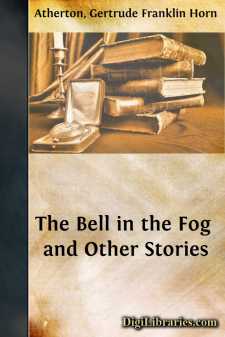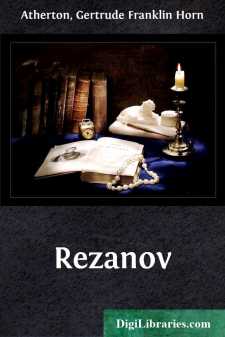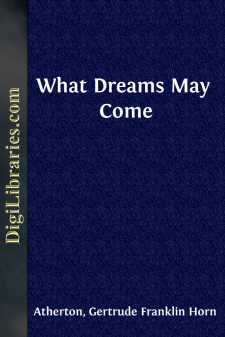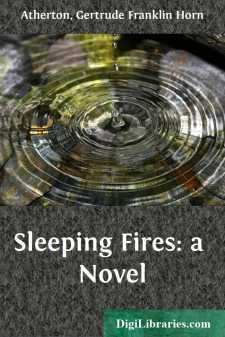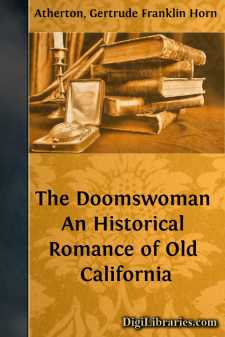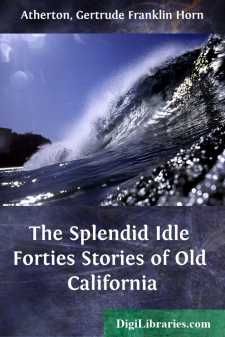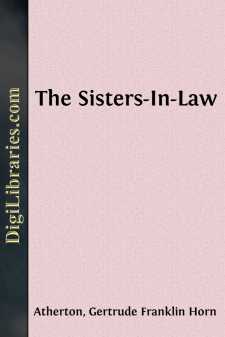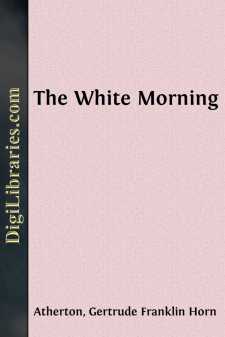Categories
- Antiques & Collectibles 13
- Architecture 36
- Art 48
- Bibles 22
- Biography & Autobiography 813
- Body, Mind & Spirit 142
- Business & Economics 28
- Children's Books 17
- Children's Fiction 14
- Computers 4
- Cooking 94
- Crafts & Hobbies 4
- Drama 346
- Education 46
- Family & Relationships 57
- Fiction 11829
- Games 19
- Gardening 17
- Health & Fitness 34
- History 1377
- House & Home 1
- Humor 147
- Juvenile Fiction 1873
- Juvenile Nonfiction 202
- Language Arts & Disciplines 88
- Law 16
- Literary Collections 686
- Literary Criticism 179
- Mathematics 13
- Medical 41
- Music 40
- Nature 179
- Non-Classifiable 1768
- Performing Arts 7
- Periodicals 1453
- Philosophy 64
- Photography 2
- Poetry 896
- Political Science 203
- Psychology 42
- Reference 154
- Religion 513
- Science 126
- Self-Help 84
- Social Science 81
- Sports & Recreation 34
- Study Aids 3
- Technology & Engineering 59
- Transportation 23
- Travel 463
- True Crime 29
The Bell in the Fog and Other Stories
Categories:
Description:
Excerpt
I
The Bell in the Fog
I
he great author had realized one of the dreams of his ambitious youth, the possession of an ancestral hall in England. It was not so much the good American's reverence for ancestors that inspired the longing to consort with the ghosts of an ancient line, as artistic appreciation of the mellowness, the dignity, the aristocratic aloofness of walls that have sheltered, and furniture that has embraced, generations and generations of the dead. To mere wealth, only his astute and incomparably modern brain yielded respect; his ego raised its goose-flesh at the sight of rooms furnished with a single check, conciliatory as the taste might be. The dumping of the old interiors of Europe into the glistening shells of the United States not only roused him almost to passionate protest, but offended his patriotism—which he classified among his unworked ideals. The average American was not an artist, therefore he had no excuse for even the affectation of cosmopolitanism. Heaven knew he was national enough in everything else, from his accent to his lack of repose; let his surroundings be in keeping.
Orth had left the United States soon after his first successes, and, his art being too great to be confounded with locality, he had long since ceased to be spoken of as an American author. All civilized Europe furnished stages for his puppets, and, if never picturesque nor impassioned, his originality was as overwhelming as his style. His subtleties might not always be understood—indeed, as a rule, they were not—but the musical mystery of his language and the penetrating charm of his lofty and cultivated mind induced raptures in the initiated, forever denied to those who failed to appreciate him.
His following was not a large one, but it was very distinguished. The aristocracies of the earth gave to it; and not to understand and admire Ralph Orth was deliberately to relegate one's self to the ranks. But the elect are few, and they frequently subscribe to the circulating libraries; on the Continent, they buy the Tauchnitz edition; and had not Mr. Orth inherited a sufficiency of ancestral dollars to enable him to keep rooms in Jermyn Street, and the wardrobe of an Englishman of leisure, he might have been forced to consider the tastes of the middle-class at a desk in Hampstead. But, as it mercifully was, the fashionable and exclusive sets of London knew and sought him. He was too wary to become a fad, and too sophisticated to grate or bore; consequently, his popularity continued evenly from year to year, and long since he had come to be regarded as one of them. He was not keenly addicted to sport, but he could handle a gun, and all men respected his dignity and breeding. They cared less for his books than women did, perhaps because patience is not a characteristic of their sex. I am alluding, however, in this instance, to men-of-the-world. A group of young literary men—and one or two women—put him on a pedestal and kissed the earth before it. Naturally, they imitated him, and as this flattered him, and he had a kindly heart deep among the cere-cloths of his formalities, he sooner or later wrote "appreciations" of them all, which nobody living could understand, but which owing to the sub-title and signature answered every purpose.
With all this, however, he was not utterly content. From the 12th of August until late in the winter—when he did not go to Homburg and the Riviera—he visited the best houses in England, slept in state chambers, and meditated in historic parks; but the country was his one passion, and he longed for his own acres.
He was turning fifty when his great-aunt died and made him her heir: "as a poor reward for his immortal services to literature," read the will of this phenomenally appreciative relative. The estate was a large one. There was a rush for his books; new editions were announced. He smiled with cynicism, not unmixed with sadness; but he was very grateful for the money, and as soon as his fastidious taste would permit he bought him a country-seat.
The place gratified all his ideals and dreams—for he had romanced about his sometime English possession as he had never dreamed of woman. It had once been the property of the Church, and the ruin of cloister and chapel above the ancient wood was sharp against the low pale sky. Even the house itself was Tudor, but wealth from generation to generation had kept it in repair; and the lawns were as velvety, the hedges as rigid, the trees as aged as any in his own works. It was not a castle nor a great property, but it was quite perfect; and for a long while he felt like a bridegroom on a succession of honeymoons. He often laid his hand against the rough ivied walls in a lingering caress.
After a time, he returned the hospitalities of his friends, and his invitations, given with the exclusiveness of his great distinction, were never refused. Americans visiting England eagerly sought for letters to him; and if they were sometimes benumbed by that cold and formal presence, and awed by the silences of Chillingsworth—the few who entered there—they thrilled in anticipation of verbal triumphs, and forthwith bought an entire set of his books. It was characteristic that they dared not ask him for his autograph.
Although women invariably described him as "brilliant," a few men affirmed that he was gentle and lovable, and any one of them was well content to spend weeks at Chillingsworth with no other companion. But, on the whole, he was rather a lonely man.
It occurred to him how lonely he was one gay June morning when the sunlight was streaming through his narrow windows, illuminating tapestries and armor, the family portraits of the young profligate from whom he had made this splendid purchase, dusting its gold on the black wood of wainscot and floor. He was in the gallery at the moment, studying one of his two favorite portraits, a gallant little lad in the green costume of Robin Hood. The boy's expression was imperious and radiant, and he had that perfect beauty which in any disposition appealed so powerfully to the author. But as Orth stared to-day at the brilliant youth, of whose life he knew nothing, he suddenly became aware of a human stirring at the foundations of his aesthetic pleasure.
"I wish he were alive and here," he thought, with a sigh. "What a jolly little companion he would be! And this fine old mansion would make a far more complementary setting for him than for me."
He turned away abruptly, only to find himself face to face with the portrait of a little girl who was quite unlike the boy, yet so perfect in her own way, and so unmistakably painted by the same hand, that he had long since concluded they had been brother and sister. She was angelically fair, and, young as she was—she could not have been more than six years old—her dark-blue eyes had a beauty of mind which must have been remarkable twenty years later. Her pouting mouth was like a little scarlet serpent, her skin almost transparent, her pale hair fell waving—not curled with the orthodoxy of childhood—about her tender bare shoulders. She wore a long white frock, and clasped tightly against her breast a doll far more gorgeously arrayed than herself. Behind her were the ruins and the woods of Chillingsworth.
Orth had studied this portrait many times, for the sake of an art which he understood almost as well as his own; but to-day he saw only the lovely child. He forgot even the boy in the intensity of this new and personal absorption.
"Did she live to grow up, I wonder?" he thought. "She should have made a remarkable, even a famous woman, with those eyes and that brow, but—could the spirit within that ethereal frame stand the enlightenments of maturity? Would not that mind—purged, perhaps, in a long probation from the dross of other existences—flee in disgust from the commonplace problems of a woman's life? Such perfect beings should die while they are still perfect. Still, it is possible that this little girl, whoever she was, was idealized by the artist, who painted into her his own dream of exquisite childhood."
Again he turned away impatiently. "I believe I am rather fond of children," he admitted. "I catch myself watching them on the street when they are pretty enough. Well, who does not like them?" he added, with some defiance.
He went back to his work; he was chiselling a story which was to be the foremost excuse of a magazine as yet unborn. At the end of half an hour he threw down his wondrous instrument—which looked not unlike an ordinary pen—and making no attempt to disobey the desire that possessed him, went back to the gallery. The dark splendid boy, the angelic little girl were all he saw—even of the several children in that roll-call of the past—and they seemed to look straight down his eyes into depths where the fragmentary ghosts of unrecorded ancestors gave faint musical response.
"The dead's kindly recognition of the dead," he thought. "But I wish these children were alive."
For a week he haunted the gallery, and the children haunted him. Then he became impatient and angry. "I am mooning like a barren woman," he exclaimed. "I must take the briefest way of getting those youngsters off my mind."
With the help of his secretary, he ransacked the library, and finally brought to light the gallery catalogue which had been named in the inventory. He discovered that his children were the Viscount Tancred and the Lady Blanche Mortlake, son and daughter of the second Earl of Teignmouth. Little wiser than before, he sat down at once and wrote to the present earl, asking for some account of the lives of the children. He awaited the answer with more restlessness than he usually permitted himself, and took long walks, ostentatiously avoiding the gallery.
"I believe those youngsters have obsessed me," he thought, more than once. "They certainly are beautiful enough, and the last time I looked at them in that waning light they were fairly alive. Would that they were, and scampering about this park."
Lord Teignmouth, who was intensely grateful to him, answered promptly.
"I am afraid," he wrote, "that I don't know much about my ancestors—those who didn't do something or other; but I have a vague remembrance of having been told by an aunt of mine, who lives on the family traditions—she isn't married—that the little chap was drowned in the river, and that the little girl died too—I mean when she was a little girl—wasted away, or something—I'm such a beastly idiot about expressing myself, that I wouldn't dare to write to you at all if you weren't really great. That is actually all I can tell you, and I am afraid the painter was their only biographer."
The author was gratified that the girl had died young, but grieved for the boy. Although he had avoided the gallery of late, his practised imagination had evoked from the throngs of history the high-handed and brilliant, surely adventurous career of the third Earl of Teignmouth. He had pondered upon the deep delights of directing such a mind and character, and had caught himself envying the dust that was older still. When he read of the lad's early death, in spite of his regret that such promise should have come to naught, he admitted to a secret thrill of satisfaction that the boy had so soon ceased to belong to any one. Then he smiled with both sadness and humor.
"What an old fool I am!" he admitted. "I believe I not only wish those children were alive, but that they were my own."
The frank admission proved fatal. He made straight for the gallery. The boy, after the interval of separation, seemed more spiritedly alive than ever, the little girl to suggest, with her faint appealing smile, that she would like to be taken up and cuddled.
"I must try another way," he thought, desperately, after that long communion. "I must write them out of me."
He went back to the library and locked up the tour de force which had ceased to command his classic faculty. At once, he began to write the story of the brief lives of the children, much to the amazement of that faculty, which was little accustomed to the simplicities. Nevertheless, before he had written three chapters, he knew that he was at work upon a masterpiece—and more: he was experiencing a pleasure so keen that once and again his hand trembled, and he saw the page through a mist. Although his characters had always been objective to himself and his more patient readers, none knew better than he—a man of no delusions—that they were so remote and exclusive as barely to escape being mere mentalities; they were never the pulsing living creations of the more full-blooded genius. But he had been content to have it so. His creations might find and leave him cold, but he had known his highest satisfaction in chiselling the statuettes, extracting subtle and elevating harmonies, while combining words as no man of his tongue had combined them before.
But the children were not statuettes. He had loved and brooded over them long ere he had thought to tuck them into his pen, and on its first stroke they danced out alive. The old mansion echoed with their laughter, with their delightful and original pranks. Mr. Orth knew nothing of children, therefore all the pranks he invented were as original as his faculty. The little girl clung to his hand or knee as they both followed the adventurous course of their common idol, the boy. When Orth realized how alive they were, he opened each room of his home to them in turn, that evermore he might have sacred and poignant memories with all parts of the stately mansion where he must dwell alone to the end. He selected their bedrooms, and hovered over them—not through infantile disorders, which were beyond even his imagination,—but through those painful intervals incident upon the enterprising spirit of the boy and the devoted obedience of the girl to fraternal command. He ignored the second Lord Teignmouth; he was himself their father, and he admired himself extravagantly for the first time; art had chastened him long since. Oddly enough, the children had no mother, not even the memory of one.
He wrote the book more slowly than was his wont, and spent delightful hours pondering upon the chapter of the morrow. He looked forward to the conclusion with a sort of terror, and made up his mind that when the inevitable last word was written he should start at once for Homburg. Incalculable times a day he went to the gallery, for he no longer had any desire to write the children out of his mind, and his eyes hungered for them. They were his now. It was with an effort that he sometimes humorously reminded himself that another man had fathered them, and that their little skeletons were under the choir of the chapel. Not even for peace of mind would he have descended into the vaults of the lords of Chillingsworth and looked upon the marble effigies of his children. Nevertheless, when in a superhumorous mood, he dwelt upon his high satisfaction in having been enabled by his great-aunt to purchase all that was left of them.
For two months he lived in his fool's paradise, and then he knew that the book must end. He nerved himself to nurse the little girl through her wasting illness, and when he clasped her hands, his own shook, his knees trembled. Desolation settled upon the house, and he wished he had left one corner of it to which he could retreat unhaunted by the child's presence. He took long tramps, avoiding the river with a sensation next to panic. It was two days before he got back to his table, and then he had made up his mind to let the boy live. To kill him off, too, was more than his augmented stock of human nature could endure. After all, the lad's death had been purely accidental, wanton. It was just that he should live—with one of the author's inimitable suggestions of future greatness; but, at the end, the parting was almost as bitter as the other. Orth knew then how men feel when their sons go forth to encounter the world and ask no more of the old companionship.
The author's boxes were packed. He sent the manuscript to his publisher an hour after it was finished—he could not have given it a final reading to have saved it from failure—directed his secretary to examine the proof under a microscope, and left the next morning for Homburg. There, in inmost circles, he forgot his children. He visited in several of the great houses of the Continent until November; then returned to London to find his book the literary topic of the day. His secretary handed him the reviews; and for once in a way he read the finalities of the nameless. He found himself hailed as a genius, and compared in astonished phrases to the prodigiously clever talent which the world for twenty years had isolated under the name of Ralph Orth. This pleased him, for every writer is human enough to wish to be hailed as a genius, and immediately. Many are, and many wait; it depends upon the fashion of the moment, and the needs and bias of those who write of writers. Orth had waited twenty years; but his past was bedecked with the headstones of geniuses long since forgotten. He was gratified to come thus publicly into his estate, but soon reminded himself that all the adulation of which a belated world was capable could not give him one thrill of the pleasure which the companionship of that book had given him, while creating. It was the keenest pleasure in his memory, and when a man is fifty and has written many books, that is saying a great deal.
He allowed what society was in town to lavish honors upon him for something over a month, then cancelled all his engagements and went down to Chillingsworth.
His estate was in Hertfordshire, that county of gentle hills and tangled lanes, of ancient oaks and wide wild heaths, of historic houses, and dark woods, and green fields innumerable—a Wordsworthian shire, steeped in the deepest peace of England. As Orth drove towards his own gates he had the typical English sunset to gaze upon, a red streak with a church spire against it. His woods were silent. In the fields, the cows stood as if conscious of their part. The ivy on his old gray towers had been young with his children.
He spent a haunted night, but the next day stranger happenings began.
II
He rose early, and went for one of his long walks. England seems to cry out to be walked upon, and Orth, like others of the transplanted, experienced to the full the country's gift of foot-restlessness and mental calm. Calm flees, however, when the ego is rampant, and to-day, as upon others too recent, Orth's soul was as restless as his feet. He had walked for two hours when he entered the wood of his neighbor's estate, a domain seldom honored by him, as it, too, had been bought by an American—a flighty hunting widow, who displeased the fastidious taste of the author. He heard children's voices, and turned with the quick prompting of retreat.
As he did so, he came face to face, on the narrow path, with a little girl. For the moment he was possessed by the most hideous sensation which can visit a man's being—abject terror. He believed that body and soul were disintegrating. The child before him was his child, the original of a portrait in which the artist, dead two centuries ago, had missed exact fidelity, after all. The difference, even his rolling vision took note, lay in the warm pure living whiteness and the deeper spiritual suggestion of the child in his path. Fortunately for his self-respect, the surrender lasted but a moment. The little girl spoke.
"You look real sick,"


